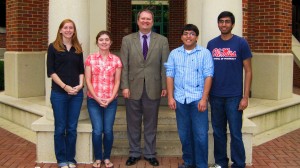OXFORD, Miss. – The dean of the University of Mississippi Graduate School is the recipient of NASA’s Outstanding Public Leadership Medal.
John Z. Kiss is being awarded the prestigious honor, which recognizes nongovernment employees for notable leadership accomplishments that have significantly influenced the NASA mission. The renowned scientist has worked with NASA for nearly three decades, having served as vice chair of the International Committee on Space Research.
As TROPI (an experiment to investigate the growth and development of plant seedlings under various gravity and lighting combinations) spaceflight project director from 2004 to 2010, Kiss supervised 36 scientists and engineers at four NASA centers and two centers of the European Space Agency. These efforts resulted in two successful projects on the International Space Station.
“I have worked with NASA for 27 years and feel humbled and honored to receive this medal,” Kiss said. “We have had seven spaceflight projects, which have been on the space shuttle and now the International Space Station. Thus, this award is shared by the numerous colleagues, co-workers, undergraduates and graduate students who have been part of these exciting projects.”
Kiss’ Seedling Growth-1 experiment was aboard SpaceX-2, which brought the payload to the ISS last year. A professor of biology, he is principal investigator on “Novel Explorations into the Interactions between Light and Gravity Sensing in Plants.” Part of the Fundamental Space Biology program at NASA, the program is designed to study light and gravity signaling in plants, and their effects on cell growth and proliferation. It also has potential for improving crop species on Earth to obtain increased production and sustainability.
“I feel very privileged to contribute, in a small way, to the excitement of space research and to be part of NASA’s broader mission to educate and inspire the next generation,” Kiss said.
The OPLM award honors sustained leadership and exceptionally high-impact leadership achievement in advancing the agency’s goals and image in present and future terms.
Two NASA officials said Kiss is most worthy of the award.
“I’ve had the pleasure of knowing John for about 10 years and all during those years, I’ve been impressed with John as a leader,” said Sidney Sun, chief of NASA’s Space Biosciences Division. “He’s been a leader in plant physiology, identifying how plants respond to different lighting and gravitational conditions.”
Kiss is a pioneer in studying plants in fractional (or reduced) gravity, research that is impossible to do on Earth, Sun said.
“His leadership of the American Society for Gravitational and Space Biology was critical during a time when scientific funding became precariously low,” he said. “I’ve also seen him be a tremendous mentor and professor to young scientists, helping them grow in their career paths.”
Marianne Steele, project manager at Lockheed Martin, said Kiss is an excellent researcher in plant biology, well known internationally and nationally for his critical questions and results in exploring and understanding the fundamental behaviors and underlying mechanisms of plants.
“Dr. Kiss is a people person of great integrity who steps-up to challenges, follows through and is accountable,” Steele said. “It has been and continues to be a very positive personal and professional experience for me to work with him.”
Kiss and his colleagues are continuing to work with NASA-Ames on the Seedling Growth-2 project, which is scheduled to launch Sept. 19 on the SpaceX-4 mission to the ISS.
“Since plants will be a necessary part of bioregenerative life support needed to send humans to Mars and beyond, the knowledge obtained from our spaceflight experiments will be critical for developing ways to effectively use plants in these life-support systems,” Kiss said.
Kiss collaborated with F. Javier Medina of Centro de Investigaciones Biológicas in Madrid. UM post-doctoral researchers Kathy Millar and Josh Vandenbrink, and undergraduates Neel Patel of Water Valley, Logan Williams of Collinsville, Tennessee, and Alison Neel of Hattiesburg, assisted Kiss. Private contractor SpaceX is responsible for launching the experiments.
The hypothesis of their research is that positive red-light sensing, which was known in older plant lineages, is masked by normal 1-g conditions in more recently evolved lineages. Through the experiment, the scientists aim to confirm and characterize the red-light-dependent phototropic response (how the seedlings germinate under the deep-space illumination) in flowering plants.
The experiment was conducted with different genotypes of the model plant Arabidopsis thaliana in experimental containers placed in the European Modular Cultivation System, a large incubator that provides control over the atmosphere, lighting and humidity of growth chambers to study plant growth on the ISS. The experiment containers contained white, blue and red lights that can be controlled from the ground to expose the plants to different kinds of light.
“By using the two centrifuges in the EMCS, it was possible to carry out the experiment in microgravity and fractional gravity, along with the 1-g control, within the same space environment,” Kiss said. “Following a six-day time course in the EMCS, the samples were either frozen or chemically fixed and returned to us. Additionally, images were taken throughout the whole experiment and downloaded real time.”
For information, on the latest mission, go to http://www.nasa.gov/ames/research/space-biosciences/seedling-growth-2/.
